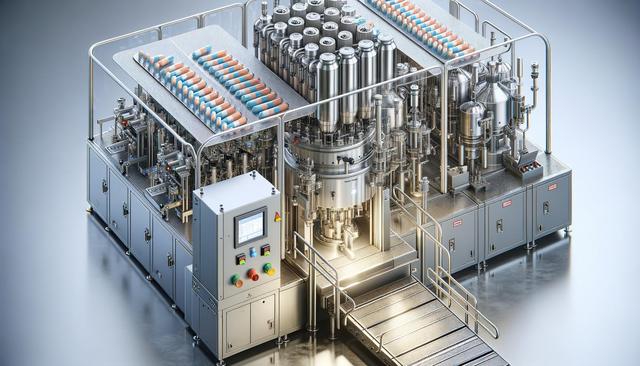Understanding the Role of Capsule Filling Machines in Pharma Manufacturing
Capsule filling machines are essential tools in the pharmaceutical industry, enabling manufacturers to produce high volumes of capsules efficiently and with high precision. These machines are designed to automate the process of filling capsules with powders, granules, or liquids, providing a consistent and repeatable method that reduces human error. In environments where accuracy and hygiene are paramount, capsule filling equipment plays a critical role in meeting regulatory standards and consumer safety expectations. This automation also reduces the workload on human operators, freeing up resources for other critical tasks in the production pipeline.
By ensuring uniform dosages, capsule filling machines contribute to the overall quality assurance strategy within pharmaceutical manufacturing. These machines are designed to handle a range of capsule sizes and materials, including gelatin and vegetarian capsules, which makes them highly flexible for a variety of product lines. Their ability to integrate with quality control systems, such as weight checks and rejection systems, promotes compliance with Good Manufacturing Practice (GMP) standards and other regulatory requirements.
Key Features and Functionality of Capsule Filling Machines
Modern capsule filling machines come equipped with a range of features that enhance their accuracy and efficiency. These include advanced dosing systems, automated alignment mechanisms, and integrated cleaning functions. The dosing systems are particularly important, as they ensure the correct amount of material is dispensed into each capsule. This is crucial for maintaining product consistency and meeting dosage specifications set by regulatory authorities.
Some typical features found in high-performing capsule filling machines include:
- Adjustable filling stations for various capsule sizes
- Automated rejection of defective capsules
- Touchscreen controls for easy operation and monitoring
- HEPA filtration systems to maintain cleanroom standards
These features help manufacturers achieve high throughput rates while minimizing the risk of cross-contamination. Additionally, many machines offer modular designs that allow for quick changeovers between product batches, improving overall production flexibility.
Precision and Contamination Control in Capsule Filling
Accuracy in dosage and contamination prevention are two of the most critical factors in pharmaceutical manufacturing, and capsule filling machines are engineered to address both. The machines use precision dosing technologies such as tamping pins, dosators, or vacuum systems to deliver exact quantities of active pharmaceutical ingredients (APIs) into each capsule. This accuracy is not only important for therapeutic effectiveness but also for regulatory compliance.
Contamination control is another major consideration. Capsule filling machines are often built with stainless steel components and enclosed systems that reduce the risk of airborne particles and microbial contamination. Many machines also feature:
- Dust extraction units to remove excess powder
- Sterile enclosures and glove ports for safe material handling
- Automated cleaning protocols to minimize downtime
By incorporating these features, manufacturers can ensure that their capsule products meet stringent hygiene and safety standards, which is essential in both human and veterinary pharmaceutical applications.
Scalability and Efficiency in Production
As pharmaceutical companies scale their operations to meet growing market demands, the scalability of capsule filling machines becomes increasingly important. These machines are available in a range of models, from semi-automatic units suitable for small-batch production to fully automatic systems capable of processing tens of thousands of capsules per hour. This scalability allows manufacturers to choose equipment that aligns with their current capacity needs while leaving room for future growth.
Efficiency is enhanced not just by the speed of capsule filling but also by the integration with other parts of the production line. Many capsule filling machines can be linked to weighing systems, labeling units, and packaging lines to create a seamless, end-to-end manufacturing process. Benefits of scalable and efficient capsule filling solutions include:
- Reduced production time and labor costs
- Improved batch consistency and repeatability
- Minimized product waste
These advantages make capsule filling machines a smart investment for pharmaceutical companies looking to optimize their manufacturing processes and increase output without compromising on quality.
Technological Advancements and Market Trends
The pharmaceutical industry continues to evolve, and so do the technologies behind capsule filling machines. Advancements in automation, digital monitoring, and data analytics are transforming how these machines operate. For instance, some systems now offer real-time monitoring and remote diagnostics, enabling predictive maintenance and reducing unplanned downtime. This innovation supports a more proactive approach to equipment management and ensures consistent operational performance.
Another emerging trend is the use of IoT (Internet of Things) in capsule filling machines. IoT-enabled devices can collect data on performance metrics, which can then be analyzed to optimize machine settings and improve overall efficiency. Additionally, manufacturers are focusing on sustainability by designing machines that use less energy and produce less waste. Key trends influencing capsule filling technology include:
- Integration of AI for process optimization
- Use of eco-friendly materials and energy-efficient motors
- Modular system upgrades for extended machine lifespan
These innovations not only improve operational efficiency but also help pharmaceutical companies meet evolving regulatory and environmental standards.
Conclusion: Meeting Industry Demands with Reliable Solutions
In today’s fast-paced pharmaceutical landscape, capsule filling machines provide a reliable solution for achieving production accuracy, hygiene, and efficiency. Whether used in small-scale research labs or large commercial manufacturing facilities, these machines offer the performance and flexibility needed to keep up with both regulatory requirements and market demands. With ongoing advancements in automation and digital technology, capsule filling systems continue to evolve, offering even greater value to pharmaceutical manufacturers. Choosing the right machine tailored to the specific needs of a production line can significantly impact product quality, operational efficiency, and overall business success.




Leave a Reply